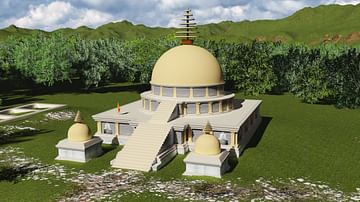Search Definitions
Browse Content (p. 243)

Definition
Lakshmi
Lakshmi (or Laksmi) is the Hindu goddess of wealth, good fortune, youth, and beauty. She is the wife of the great god Vishnu and the pair is often worshipped in tandem as Lakshmi-Narayana. Just as her husband has many avatars when he descends...

Definition
Maya Religion
Maya religious beliefs are formed on the notion that virtually everything in the world contains k'uh, or sacredness. K'uh and k'uhul, similar terms which are used to explain the spirituality of all inanimate and animate things, describe the...

Definition
Pandora
Pandora is a figure from Greek mythology who was not only the first woman, but —as an instrument of the wrath of Zeus— was held responsible for releasing the ills of humanity into the world. Pandora was also an unrelated earth goddess in...

Definition
Kanchipuram
Kanchipuram (sometimes simply called Kanchi or Kanci) is an ancient city in the Tamil Nadu region of southern India. Once a capital of the Pallava dynasty, Kanchipuram was also a noted centre of learning for Tamil and Sanskrit scholars. Known...

Definition
Taxila
When it comes to ancient history, Pakistan contains its fair share of treasures, one of the prominent of these being the ancient metropolis of Taxila. It is a city of the Gandharan civilization, sometimes known as one of its capitals, whose...

Definition
Didache
The Didache (Koine Greek: διδαχή), also known as “The Teaching,” or, “The Teaching of the Twelve Apostles,” is an enigmatic primitive Church document describing early Christian ethics, practices, and order. Discovery & Dating The existence...

Definition
Khajuraho
Khajuraho was an ancient city in the Madhya Pradesh region of northern India. From the 10th to 12th century CE it was the capital of the Chandella kings who ruled Bundelkhand. Despite Khajuraho's once great reputation as an important cultural...

Definition
Wari Civilization
The Wari civilization flourished in the coastal and highland areas of ancient Peru between c. 450 and c. 1000 CE. Based at their capital Huari, the Wari successfully exploited the diverse landscapes they controlled to construct an empire...

Definition
Yama
Yama is the Hindu god of death, king of ancestors, and final judge on the destination of souls. He is also known as the 'Restrainer', Pretaraja or 'King of Ghosts', Dharmaraja or 'King of Justice', and as Daksinasapati is considered the regent...

Definition
Bhubaneshwar
Bhubaneshwar (also spelt Bhubaneswar, Bhubanesar, and Bhuvanesvar) is a city located in the Orissa district of north-eastern India and flourished as a centre of Hindu worship from the 7th century CE. Its mass of well-preserved sandstone temples...